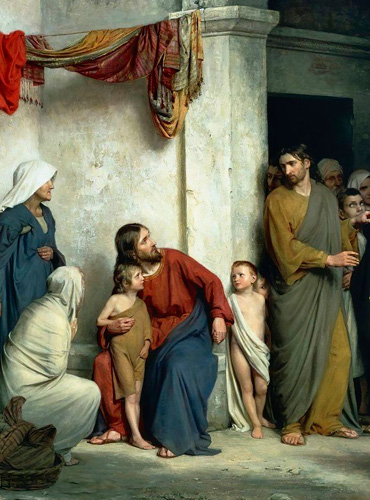Tuesday of the Seventh Week in Ordinary Time – Option 2 – Mk 9:30-37
In today’s Gospel, Saint Mark explains to us how Christ tries to teach his Apostles about His persecution, death, and Resurrection. Upon hearing it, the disciples should’ve thought about the forthcoming humiliation of their Master, and the need to be humiliated with Him. However, as Mark says, “they did not understand the saying,” but that’s sort of an understatement. They didn’t understand it at all, because right away they began to argue about who was the greatest among them, the disciples of a teacher who was going to die crucified, humiliated, and abandoned.
Since His words had no effect, Jesus taught them again, but this time He does so with His actions as well. There are three actions of Jesus that call our attention: First, Jesus takes a seat, “he sat down,” says Saint Mark. Second, “taking a child, [Jesus] placed it in their midst,” Third, Jesus embraces the child, putting His arms around it. In each of these three actions, we can first see Jesus’ humility, and then we can reflect on what we ourselves must do in our daily lives.
First, Jesus takes a seat. As Saint Jerome says, Jesus sat down in order to teach the disciples about humility, since to be seated is the position of the humble.[1] What does this mean? It means that Jesus lowered Himself to their level, Jesus went down to them. This doesn’t mean that Jesus behaved like them, but rather that Jesus, so to speak, put Himself in their shoes. He knew and understood their desires, and it was from there that He began the conversation. The same thing must happen with us. It’s easy to remain up above, high above other people’s problems, to criticize and judge, but it’s down below, with them, that we have to work. To be proud keeps us from God, the source of the graces we need to live with others, as C. S. Lewis wrote, “As long as you are proud you cannot know God. A proud man is always looking down on things and people: and, of course, as long as you are looking down you cannot see something that is above you.” Likewise, pride ruins our actions, even the greatest ones, as Pope-emeritus Benedict XVI remarked, regarding a great thinker who become too attached to his own thoughts later in life, “When one only sees his thought in all its greatness, in the end, it is precisely this greatness that is lost.” Pride destroys good anywhere, but humility keeps it safe so we can be about the things of God.
Secondly, Jesus takes a child and places it in the midst of the disciples. No one knows where Jesus got that child. Mark doesn’t say, and it seems like that’s important. The Apostles didn’t choose that child; they probably didn’t have any idea who it was, but Jesus put the child in their midst so they had to see him. The same thing happens to us: we can’t choose who we have to talk to, who we have to work with and live with. Likewise, we tend to assume the best about children; for instance, when a child starts to cry, we assume that he’s hurt, or sick, or tired. We assume the best. Why not do the same with others?
Lastly, Jesus embraces the child; He doesn’t simply say, “Look, you have to receive these little ones,” but rather He shows it with a gesture of love. Our humility should lead us to think of ourselves, as Christ says, as “the last of all and the servant of all.”
Today, let us ask for the grace, through the intercession of Mary, Model of Humility, for the grace to lower ourselves in order to live and work with others as Jesus desires.
[1] Cf. Catena Aurea, “Hieronymus: Ubi notandum, quod illi euntes disputabant de principatu, ipse sedens docet humilitatem. Principes enim laborant, humiles quiescunt.”






